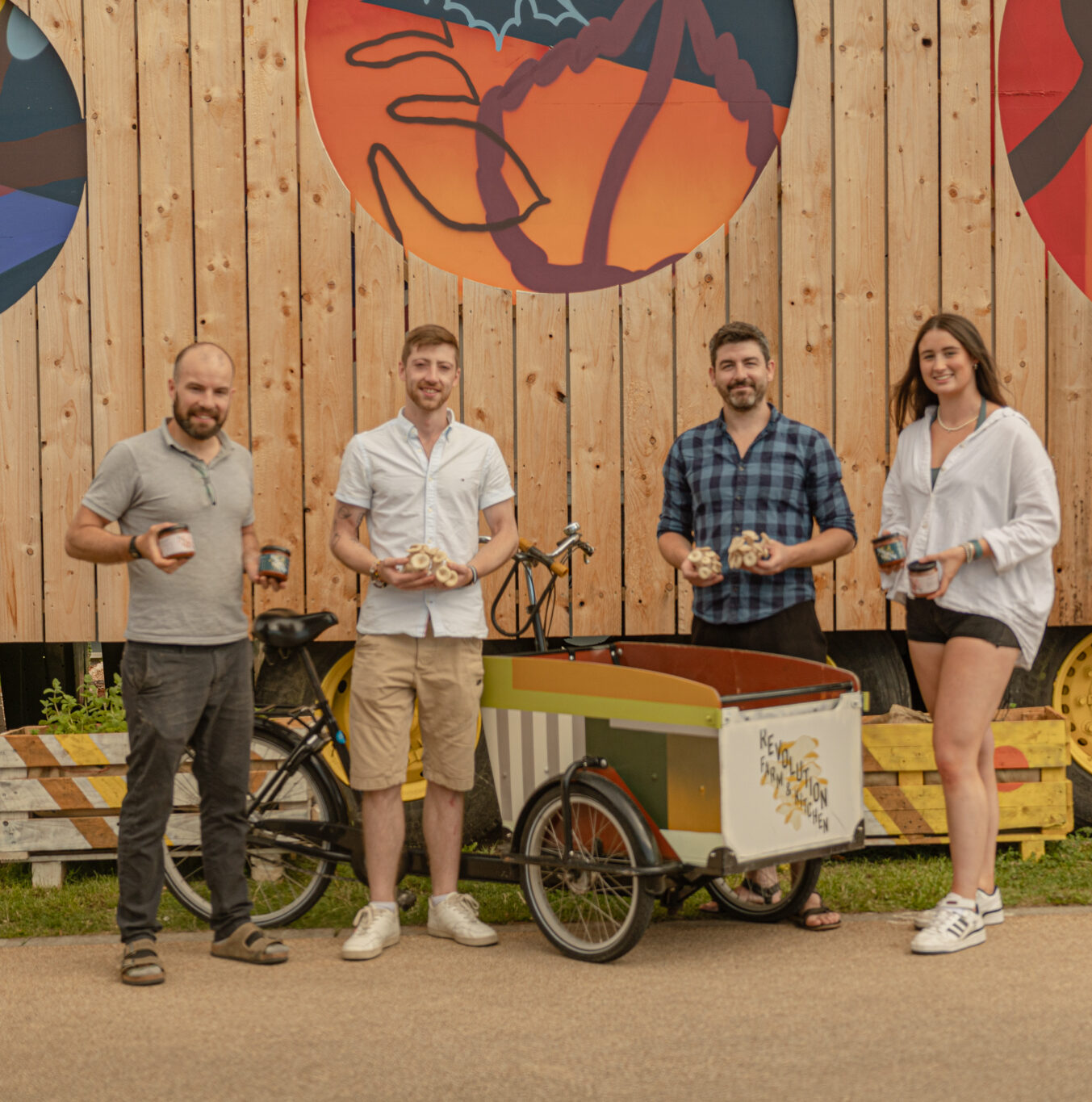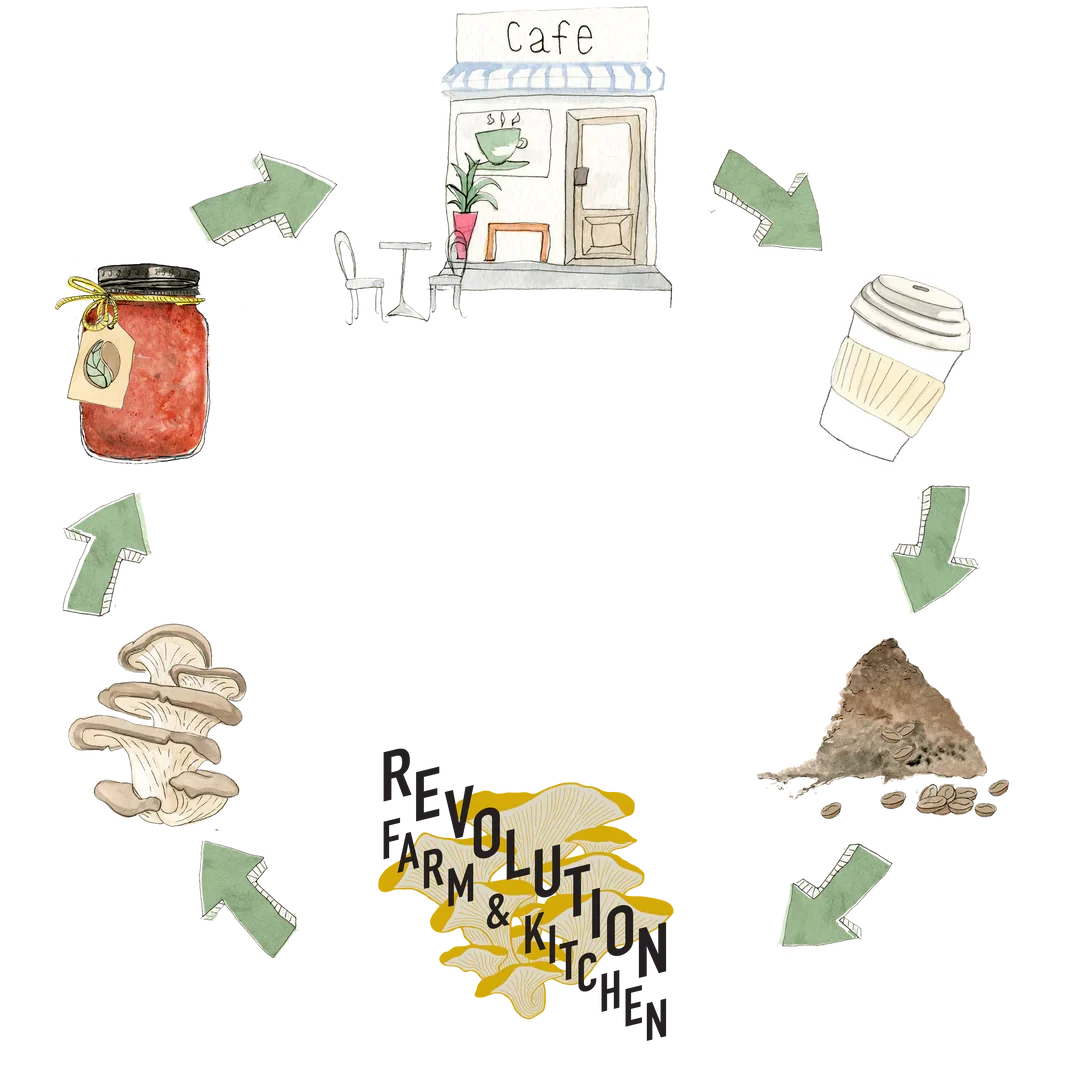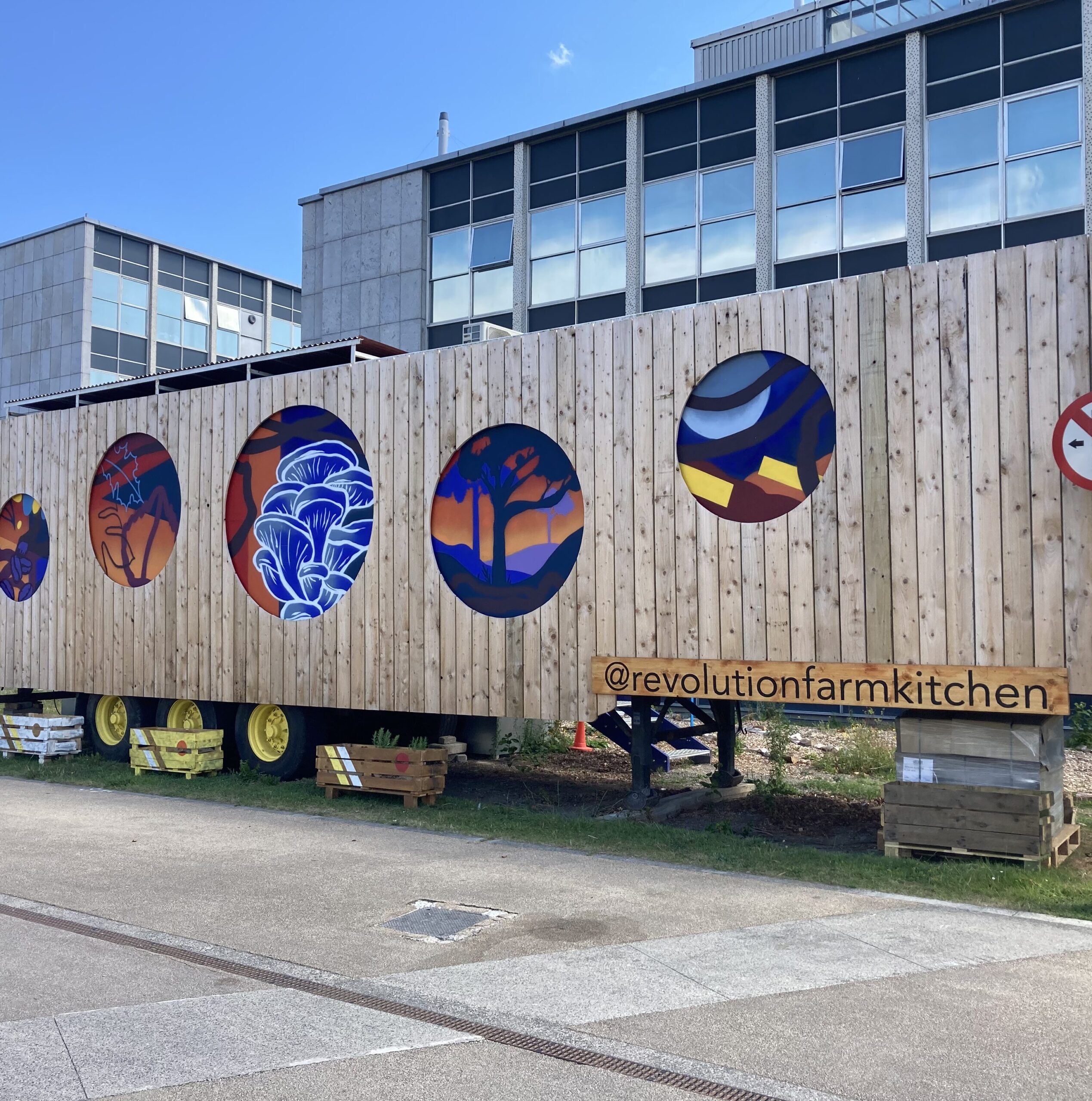Background
Two years ago, when Patrick Arnold told his friends that he was going to start using coffee grounds to grow oyster mushrooms at the bottom of his garden his friends laughed. “You are going to do what?” they asked with a certain level of skepticism.
Patrick is a chef by training and, before Covid, had been planning to open a restaurant in Dublin. Like so many of us, Covid forced him to recalibrate. “I had time to reflect,” he said. Instead of opening a restaurant, which, during Covid, was a non-starter, he, working closely with a good friend and physicist, James Egan, decided to tackle food waste. “There is so much food waste in the restaurant business,” Patrick continued. “I wanted to offer an active alternative.”

In 2020, these two friends started Revolution Farm and Kitchen. The premise is simple. Using a large container as the “farm,” and collecting coffee grounds from local restaurants and cafes which they use as their soil, they grow oyster mushrooms. (For all of the times you have tossed coffee grounds into the bin you may not have realised how nutrient rich they are. They have also, as James reminds us, travelled a long way to get here so why not make the best use of them.) Benefiting from Patrick’s expertise as a chef and time spent working in Bologna, Italy, where he came to love making ragu, they now make a mushroom ragu and a mushroom chilli which they sell, by the jar, in select shops and delis in Dublin, and via the “Neighbour Food’ app.
Collaboration
Their micro-business caught the attention of Professor Suzi Jarvis, founding director of UCD Innovation Academy, and it immediately piqued her interest. This was the philosophy of UCD Innovation Academy in action: an interdisciplinary collaboration – in this case a chef and a physicist – assessing the challenges we face in the 21st century and using the entrepreneurial mindset to think creatively, seize an opportunity and run with it.
Suzi invited Patrick and James to bring Revolution Farm and Kitchen to UCD’s campus. Students participating in the Innovation in Sustainability module were offered the opportunity to work with the Revolution Farm and Kitchen team, and to help make their business grow.
“This is an important collaboration,” Suzi says, “because unless we can find some mechanism whereby these sustainably focused micro-businesses can be financially sustainable, we’re going to struggle in the coming years.”

Business model
UCD Innovation Academy’s Maurice Knightly works closely with Patrick on this collaboration. “Our vision for the Revolution Farm and Kitchen is that this becomes a replicable self-sustaining business – sustainable from an environmental point of view, and sustainable from a business point of view.” With 17 years at O’Brien’s Irish Sandwich Bars (growing the franchise to almost 300 outlets in 15 years), Maurice sees the potential for this micro-enterprise. As he puts it, there is the possibility for two businesses here: the business itself – the growing of the mushrooms, the selling of the “Revolution Ragu,” and “Revolution Chili,” with the revenue generated from that; and, the possibility for a franchise or licensing arrangement. “There is no reason why something like this couldn’t work on other campuses across Ireland,” he says, “University campuses or business campuses.”
Maurice cites large tech companies who have significant green spaces around their premises. He notes that society is moving (slowly) away from the environmentally damaging approach that is maintaining a perfect lawn using fertilizers and pesticides. Although the current focus is on wilding, micro-enterprises like Revolution Farm and Kitchen offer another alternative. Every business campus has a cafe which means that every business campus is looking for ways to get rid of their coffee grounds. Revolution Farm and Kitchen has the potential to create a franchise toolkit, based on their learnings, and encourage and generate revenue from a Revolution Farm franchise across Ireland.
Partnerships
The timing of the collaboration couldn’t have been better. UCD Innovation Academy, in partnership with TU Dublin, is running a ground-breaking collaborative project – Convene – funded by the government’s Human Capital Initiative. It aims to transform how enterprise and higher education work together, for their mutual benefit and the benefit of society and the economy.
Revolution Farm is now a Convene Enterprise Partner. With the farm up and running on campus, the next step is to start supplying UCD’s many cafes and restaurants with Revolution Ragu, stamped ‘UCD Grown’. “On the last count there are nearly a quarter of a million students in higher education in Ireland – that’s more than the population of Cork City,” says Eleanor Kelly, who leads Convene at UCD Innovation Academy. “If these students can see the circular economy in action, can participate – regardless of their discipline – in sustainable partnerships like this, and see the final result on their campus and in their cafeterias, that’s a powerful learning for them to take forward into their future careers.”
Sustainability
Patrick is committed to sustainability – even when that means an increase in overheads. He describes their decision to commit to biodegradable bags to collect coffee grounds. It would have been much cheaper to use black plastic bags but there is an environmental cost here that he is not willing to pay.
This makes being an entrepreneur working on a sustainable food business challenging. “People’s perceptions of food is price based,” Patrick says, “and the cheaper, the better.” In this way, the Revolution Farm and Kitchen is an example of what entrepreneurs who focus on sustainability need to navigate if they are to be able to succeed.
“What is apparent is that micro businesses that have an environmentally sustainability focus find it extremely difficult to be financially sustainable,” says Suzi, “because they’re competing with companies that think they have no obligation to be environmentally sustainable.”

The Future
The challenges the Revolution Farm and Kitchen faces as it works to become a viable, environmentally sustainable business epitomize the challenges we all face as we strive for an environmentally sustainable world in an uncertain future. In their partnership with UCD’s Innovation Academy they don’t have to tackle these challenges alone. “Innovation doesn’t happen in silos,” says Maurice. And the benefit goes both ways. Students at the Academy get to tackle real world challenges.
They learn from doing which is one of the key mantras of the academy. They come face to face with enterprise literally on campus. And they get to engage, not just with well-established corporations but with fledgling companies and start ups too. And by working across disciplines – students working with the Revolution Farm come from Science, Law, Agricultural Science and Engineering – there is no doubt that they will come up with some truly innovative solutions.
Solutions that could well ensure Revolution Farm’s future, and our own.
Convene brings together Ireland’s two largest universities, University College Dublin and Technological University Dublin, to transform university and enterprise engagement in support of an innovative and agile Irish society and economy, powered by the workforce of the future. Convene is funded by the Human Capital Initiative, an historic investment in Irish higher education that’s future proofing graduates with relevant skills, identifying emerging needs from enterprise and promoting reform and innovation in higher education. Convene Case Studies showcases examples of collaboration between higher education and enterprise, demonstrates the mutual value working together brings and seeks to provide different models of cooperation others may draw on. For more information, please contact Eleanor Kelly, Strategic Partnerships Lead at UCD Innovation Academy, Eleanor.Kelly@ucd.ie.

Author: Lucy Carrigan
Convene brings together Ireland’s two largest universities, University College Dublin and Technological University Dublin, to transform university and enterprise engagement in support of an innovative and agile Irish society and economy, powered by the workforce of the future. Convene is funded by the Human Capital Initiative, an historic investment in Irish higher education that’s future proofing graduates with relevant skills, identifying emerging needs from enterprise and promoting reform and innovation in higher education.
Convene Case Studies showcases examples of collaboration between higher education and enterprise, demonstrates the mutual value working together brings and seeks to provide different models of cooperation others may draw on. For more information, please contact Eleanor Kelly, Strategic Partnerships Lead at UCD Innovation Academy, Eleanor.Kelly@ucd.ie

